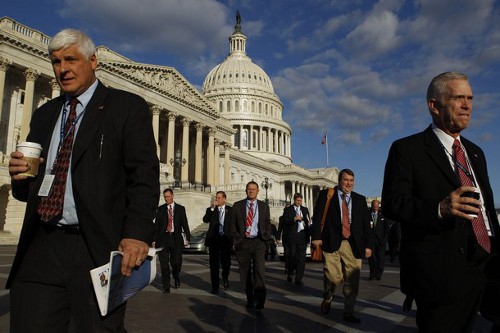
Having worked to convince NATO allies to stay committed in Afghanistan, President Obama now returns home, where questions about America’s role in the world may be growing in the wake of this month’s mid-term elections.
Clearly, the U.S. mid-term elections were not about foreign policy. Yet they may have a significant impact nonetheless, with both the left and right exerting a new pull toward U.S. retrenchment from the world – paralleling the cuts in ambition and budgets seen in Europe. The challenge facing Republicans and Democrats alike will be to make the case for a continued robust U.S. role in foreign affairs as essential to the future well-being and security of the United States and, indeed, the world.
We know relatively little about what foreign policy views the newly elected Tea Party candidates bring to office. Indeed, there is probably no single view. The Tea Party movement is about the economy, the role of government, and the direction of the United States at home. Foreign policy was scarcely discussed during the campaign – meaning at a minimum that it is a lower priority than domestic policy.
It is therefore impossible to predict exactly what foreign policies the new Tea Party-backed members of Congress will adopt, or indeed to assume that there will be a single trend. One could imagine a resolute backing of the U.S. military, a demand for scaling back nation-building in Afghanistan, and calls for military options against Iran, all occurring simultaneously.
Nonetheless, one result of the mid-term elections is an increased risk that – in the words of Senator Lindsay Graham – “an unholy Alliance” emerges linking the far-left and far-right in seeking a more isolationist foreign policy.
On the left, the attention of the Democrats must now be focused on reversing their steep decline in political support. This means a relentless focus on the issues that have turned voters away, with economic growth and jobs topping the list. Those Democrats remaining in Congress are among the more liberal in their party. Many were uncomfortable with Iraq, Afghanistan, and the “war on terror” to begin with, and will now place an even higher priority on resources for recovery at home rather than adventures abroad.
Many of these same arguments will resonate on the right: that Washington has become out of touch, spending trillions of dollars abroad while failing to deliver for the American people at home. The government has sought to become a global policeman and nation-builder, and needs to be reined in to solve America’s problems, not the world’s.
The original Tea Party movement – the 1770’s Boston variety – brings to mind the Revolutionary War slogan, “Don’t Tread on Me” (still the New Hampshire state motto), complete with a picture of a rattlesnake. That image – deadly to enemies and best left alone – seems again to capture part of the national mood.
Arguments about restoring America’s strength at home are not without merit. One need only point to the recent G-20 Summit in Korea, the massive U.S. debt held by China, and the enormous U.S. federal deficit to argue that the United States needs to rebuild a strong economy in order to sustain a robust U.S. role in the world. One can equally point to education, infrastructure, and energy as areas where investment is needed to assure America’s future strength. Indeed, this argument was extensively made in the Obama Administration’s U.S. National Security Strategy.
Yet the risk that this argument is taken too far, leading to a retrenchment of America’s role in the world, is both real and dangerous. To the extent the United States is seen as weak, distracted, and in retreat, other actors may feel emboldened: China in disputed waters in Asia; the Taliban in Pakistan and Afghanistan; Iran in its pursuit of nuclear weapons; Hezbollah and Hamas in the Middle East; Russia in asserting a sphere of influence around itself; Chavez in Latin America; Islamist extremists pursuing terrorism globally. If the United States seeks to put the world on hold while fixing its domestic problems, crises in the world will likely get worse.
This scenario – of a retrenching America and increasing global crises – has played out before: after World War I, World War II, the Cold War, and even the Balkans wars of the 1990s. Each time, the seduction of isolationism proved self-destructive. Avoiding another repeat requires that the President and mainstream leaders from both parties work together. While impossible on many domestic issues, there is a historical precedent for such bipartisan cooperation on national security, sustaining a long-term U.S. global strategy over decades. It is time for leaders on both sides to rebuild that kind of cooperation on national security, avoiding not only the temptation of hyper-partisan gridlock, but also of a bipartisan drift toward isolationism.
Kurt Volker is a senior adviser at the Atlantic Council and member of the Council’s Strategic Advisors Group. He is also a former US ambassador to NATO and current managing director of the Center for Transatlantic Relations at Johns Hopkins’ School of Advanced International Studies. This article originally appeared in La Stampa. Photo Credit: Reuters Pictures..
Image: New%20Congressmen500.jpg
